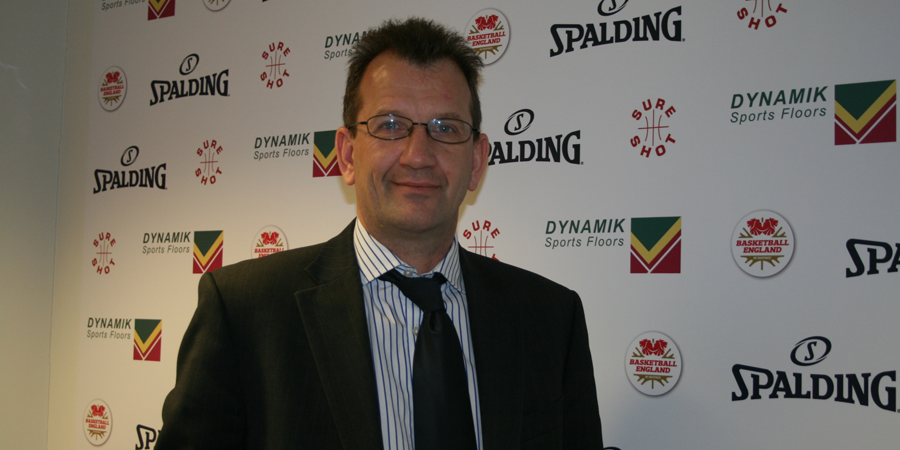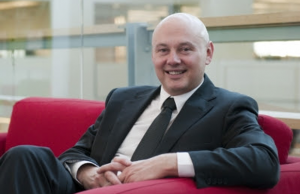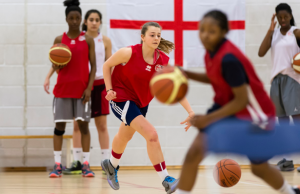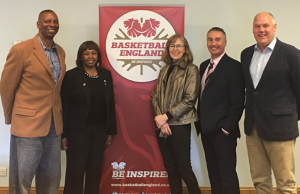Jan Hagen Dimisses Suggestions of Foul Play as BE Engage with Bball UK

Basketball England Independent Chairman Jan Hagen has dismissed suggestions of foul play with the NGB’s departed staff members, as former CEO Huw Morgan’s exit has enabled official negotiations to advance with Bball UK.
Morgan’s departure last month meant he became the fourth Basketball England member of staff to leave to join Bball UK, the private entity that is attempting to funnel £36million into the British game, following an investment opportunity that was uncovered while they were working for the NGB.
With Hagen awaiting on results from a Sport England internal audit to ensure nothing was awry, he insists all conflicts of interest were managed appropriately.
“You can look at it as positively or negatively as you like, it all depends on what people want to see,” Hagen said.
“When (former CEO) Keith Mair was crucified two years ago by a lot of people, everyone failed to notice that he had actually put together in place, financial reserves and took England Basketball (as it was named then) into a solvent position with reserves in the bank.
“Now, as an NGB they were dysfunctional, but they were solvent, and they performed their basic function in administering the national league structure etc. Obviously they become a little bit reliant on the Sport England model, which wasn’t ideal, so we put together a strategy that actually said, ok, if we want to get a funding model in place where we can support grassroots development from primary school level all the way through to national teams, we have to find all the money as well as Sport England money. It was a simple as that.
“So we put a plan together with the 3 new Independents, myself, the rest of the board and the team in the office, a strategy that we believe would make it appealing for an external investor to the sport. We presented it to Keith, and we said ‘can you deliver on this?’, he said no, so we said ok we need somebody else to lead the hunt for money.
“Keith left, and we hired Huw Morgan, with the brief to find an alternative pool that would bring investment into the sport. He did that. We gave him total free reign at that time, on how that model would work. We didn’t really anticipate at the time that he would get so excited about the opportunity that he would want to be a part of it, but arguably on one level I’m delighted that he is, because if those four guys want to attest their career to a speculative opportunity that they believe in, then that gives the opportunity a little bit more credibility in my book.
“I can also see the flip side, that a lot of people think that this was pre-engineered, they planned this the whole time and they’ve shafted basketball. I really can’t see how they’ve shafted basketball because quite frankly what they’ve found is a opportunity we can get a significant investment into the sport, with a very, very significant amount of money that would flow into the NGB every year, for which we have discretionary console on how we want to spend it. Whether it’s primary schools, 3 on 3 tournaments, whatever we want to do with it, that’s going to be our call rather than dictated by an external body like Sport England for example.”
The conflict management protocol included updating the terms of Morgan’s employment contract, isolating him from all meetings regarding the professional league operating license, and keeping no related paperwork or documents in the office.
“That’s been the debate at every single board meeting – what do we put out in the public,” Hagen responded when asked why there has been a lack of communication.
“Everything was so speculative for a long time. When this proposition was first tabled we didn’t put out anything in the public until we felt it was actually credible that the money actually existed, and this was after the guys had declared their conflict that they wanted to go with this. We still had no indication if this was a real venture so the first thing we did was the due diligence of if there is actually some money there.
“As soon as we found out there was money there, as soon as the company stuck over a million pounds into an escrow account in the UK just to show some goodwill, then you suddenly start believing, ‘hey hang on a minute…’ and as soon as a company like CSM Chime Communication, people like Seb Coe start putting their weight behind it and start saying ‘hey this is credible and we’d like to invest in it as well’, you start to thinking ‘hang on a minute there might be something credible here’.
“At which point, that was literally within 5-6 days of us as a board becoming fully aware of it, we tested it first to see if the money is real, then we called the BBL and said listen guys there’s something here, what we’d like to do is put these guys in touch with you and this is where a massive debate(?) kicked in, because that’s where the BBL said ‘we don’t want to know anything’. I think that was a knee jerk reaction by the BBL and to be honest that always happens if people are passionate about their clubs and they get the feeling people want to take it away from them.
“Now they realise these guys want to work with them, not take anything away, they want to invest in it, professionalise it, and they want to make sure that whatever residual stake these franchises owners have will be worth far more than they are at the moment.
“…We want to step it up, we want to compete in Europe, we want to have a professional league we’re proud of as a country, we want to get european teams to compete in this country for european competitions, we want to improve the experience on the court, the customer experience.”
It was discussed whether to remove Morgan from his position when the situation first arose, but Hagen and the board felt that there was a number of important jobs that needed doing, and Huw, while discussions with Bball UK were still in the tentative phases, was the best person to do them.
“Huw has actually done an awful lot of other (good) stuff,” Hagen said.
“With the relocation to the new office, with the professionalisation, with all the processes inside BE, and actually putting together a membership package for the first time in actually a decade that it’s worthwhile to be a BE member for because you actually get something back, which has never been the case.
“There’s a whole lot of stuff there that he was working on that was worthwhile for us for him to continue to working on.”
Hagen feels as though the process of how it has been done is overshadowing the opportunity that is on the table; the chance to give the sport a financial base that it would have only dreamed about a year ago.
“It would be insane to not look at it,” he exclaimed. “It gives us a fixed budget to work with for the national teams for the next 7 years, it gives us a budget to invest in coaching and official development programmes, into grass roots primary school programmes, it enables us to do so much stuff we can’t do at the moment. It would also provide the professional league with a more robust financial footing.
“I think it would be a real shame if we can’t realise this investment. It’s a little bit overshadowed by the fact the process has been criticised by people and as I said earlier, if other people had been in this particular entity rather than the people that are in Bball UK now, then Huw Morgan would have been hailed as the hero of this sport rather than the villain – only by a very, very, small number of people by the way – the vast majority of the feedback we have has been extremely positive.”
Hagen sees “absolutely no reason” to step down from his position, saying he has read that there have been multiple calls for him to resign, but officially he has only received a single letter. He admits that the whole process has been “inconvenient”, but if the investors want the Bball UK team to be the ones managing the deal then that is their right. It is, after all, their money.
“I believe fundamentally we identified conflict and managed conflict which is what you normally do, which is what I do in my daily life in the city. It’s what we do all the time, you identify conflict, manage conflict then you crack on.”
The major question being asked is whether or not the departed BE Directors and CEO could have set up Bball UK as a a subsidiary of Basketball England instead of a separate entity.
“Theoretically,” he responded after a long pause. “But then the investors would have still insisted on who the management team in that company would be. The investors are the ones that have faith in these guys to deliver on the commercials of this particular deal, although it’s obvious that they will have to recruit people to perform certain tasks like running a league because they don’t have personal experience to do that.”
Though we have not been able to reach GEM investments for comment despite repeated requests, we did speak to Bball UK’s Ameesh Manek on this point.
He explained there are a number of problems that would have arisen should the company be set up as a subsidiary of Basketball England. Basketball England owning the company instead of the investor is the biggest one, but also there would be legal complications with BE awarding the professional league operating license to its own company, as well as issues around the risk of taking the liability should the projected profits not come to fruition.
As Mark Clark takes over as interim CEO, the search is underway for the permanent replacement, with a couple of candidates already identified. Hagen says it will be a senior administrator, ideally with experience from a bigger NGB – and of course, will have approval from Sport England who he said were understandably concerned when they lost 3 Independent Directors and had the CEO ring fenced.
“Quite frankly, even if Huw had stayed, I probably would have looked at replacing him in the next 6-9 months,” Hagen said.
“Because his skill set is particularly geared towards getting a new strategy, a new business model and finding money to fund it. Now I need an administrator, someone who is strong at developing an NGB as an NGB. We’re really looking at 3 phases here. Keith (Mair) doesn’t get enough credit for what he’s done, because without the reserves Keith built up, we wouldn’t have been able to invest in the research and the strategy and the planning work that we had to do in year 2. Now Huw has left that campaign of finding money, he’s a commercial beast, that’s what he is, so he wants to be involved in the commercial entity that’s monetising the assets in the game, much more. The more that he monetises the assets the more money that we would earn as an NGB and as a national team.
“He’s in a better place now than he would be as CEO of Basketball England. I think a lot of people seem to forget that. He’s actually demonstrated to me that he can find millions, I want him to keep doing that, because every time he finds millions, the national teams, BBF, Basketball England, Basketball Wales and Basketball Scotland all earn a slice of what this entity makes, so we’ll all benefit from it. The more successful they are, the more money they make out of it personally the more delighted I’m going to be.
“What has irritated me in the past is if individuals made money and the sport earned nothing.”
Both Hagen and Clark seem to be singing from the same hymn sheet in that regard, intent on putting as much protection into any potential contract with Bball UK as possible to minimise the risk the sport would face.
“We’ve discussed and outlined principles on the kind of thing Basketball England would look for and they’ll all be coded into the contract. There’s a fixed base income which is already worth a lot of money for us but then there’s percentages that basically means that the more successful they get the more the three NGBs and the national teams would earn.
“When were we last in the position to say to Team GB here’s a budget for the next 7 years? Ok it may not be 5 million pounds a year but there’s enough budget there, in total, for a credible plan and you can actually employ some long term staff and coaches to create a credible 7 year or 10 year journey for the national teams, rather than just relying on government funding that at best goes into 4 year cycles but more recently into no year or 1 year cycles!”
Hagen’s role as an Independent Chairman has been substantially more hands on than you would normally expect, something he admits.
“It’s not normal at all (for an Independent Chairman to be so heavily involved). But I think it is normal if you’re an independent chairman during a period of total transition. It’s much more hands on than it should be, because what we need in the NGB is a more heavyweight day to day management team that is taking the NGB forward in a more professional manner – so we need some recruitment there.”
It remains to be seen whether or not the Bball UK investment happens but there is no doubt that the sport’s stakeholders do need to do their due diligence on the opportunity, regardless of who it is that is involved with.
“Yes, there’s a million and 1 ways this could all blow up at some point like there always is, risk will always exist,” Hagen concluded.
“But there’s also a million and 1 ways this could work and quite frankly I’m happy to take the negativity. I’ve got the thick skin, I don’t mind people getting angry, people have a right to ask questions, and if they’re well structured credible questions, rather than wild dumbfounded allegations, I’m quite happy to respond to them. We’re doing some good stuff at the moment and what I’m thrilled about is the really positive discussions that we’re in now with all the stakeholders.
“Everybody now has an open mind to see if we can realise it, can we bring this money into the sport, and I don’t think anybody, including myself, wants to be the person that says ‘actually, no, we don’t need £36 million’, because I would challenge anyone in the sport to say we don’t need it.”
Image Credit: Basketball England
Update on 05/05/15: The original article incorrectly called the liability the NGB would face if Bball UK was set up as a private subsidiary of Basketball England as ‘debt’. The Bball UK investment plan is purely an equity investment (i.e. a cash in return for a shareholding in BBALL UK). There is absolutely no debt or loans associated with it.






1 Comment